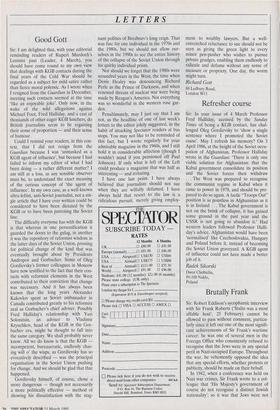LETTERS Good Gott
Sir: I am delighted that, with your editorial reminding readers of Rupert Murdoch's Leninist past (Leader, 4 March), you should have come round to my own view that dealings with KGB contacts during the final years of the Cold War should be regarded as a subject for mild satire rather than fierce moral polemic. As I wrote when I resigned from the Guardian in December, meeting such contacts seemed at the time `like an enjoyable joke'. Only now, in the wake of the wild allegations against Michael Foot, Fred Halliday, and a cast of thousands of other eager KGB lunchers, do British journalists seem to he regaining their sense of proportion — and their sense of humour.
Could I remind your readers, in this con- text, that I did not resign from the Guardian because I was 'unmasked as a KGB agent of influence', but because I had failed to inform my editor of what I had been doing — a rather different matter? I am still at a loss, as any sensible observer must be, to understand the exact meaning of the curious concept of 'the agent of influence'. In my own case, as a well-known ultra-leftist, anti-Soviet journalist, not a sin- gle article that I have ever written could be considered to have been dictated by the KGB or to have been parroting the Soviet line.
The difficulty everyone has with the KGB is that whereas in one personification it guarded the doors to the gulag, in another it was the repository of reformist wisdom in the latter days of the Soviet Union, pressing for political change of the kind that was eventually brought about by Presidents Andropov and Gorbachev. Some of Oleg Gordievsky's former colleagues in Moscow have now testified to the fact that their con- tacts with reformist elements in the West contributed to their conviction that change was necessary. And it has always been known that the long years Alexander Kakovlov spent as Soviet ambassador in Canada contributed greatly to his reformist zeal as Gorbachev's chief adviser. Possibly Fred Halliday's relationship with Yuri Solonitsin, an adviser to Vladimir Kryuchkov, head of the KGB in the Gor- bachev era, might be thought to fall into the same category. We shall probably never know. All we do know is that the KGB incompetent, bureaucratic, endlessly chas- ing will o' the wisps, as Gordievsky has so evocatively described — was the principal organisation in the Soviet Union pushing for change. And we should be glad that that happened.
Gordievsky himself, of course, chose a more dangerous — though not necessarily a more politically effective — method of showing his dissatisfaction with the stag- nant politics of Brezhnev's long reign. That was fine for one individual in the 1970s and the 1980s, but we should not allow our- selves in the 1990s to see the entire history of the collapse of the Soviet Union through his quirky individual prism.
Nor should we forget that the 1980s were scoundrel years in the West, the time when Denis Healey was denouncing Richard Perle as the Prince of Darkness, and when renewed threats of nuclear war were being made by Reagan's America. Not everything was so wonderful in the western rose gar- den.
Penultimately, may I just say that I am not, as the headline of one of last week's letters to the editor jokily suggested, in the habit of attacking Spectator readers at bus stops. You may not like to be reminded of this fact, but I wrote regularly for your admirable magazine in the 1960s, and I still hold it in considerable affection (though I wouldn't mind if you pensioned off Paul Johnson). If only what is left of the Left could produce a magazine that was half as interesting — and irritating. I have one last point. I have always believed that journalists should not sue when they are wilfully defamed. I have always held that resort to the law is a ridiculous pursuit, merely giving employ-
ment to wealthy lawyers. But a well- entrenched reluctance to sue should not be seen as giving the green light to every minor pen-pusher who wishes to pursue private grudges, enabling them endlessly to ridicule and defame without any sense of measure or propriety. One day, the worm might turn.
Richard Gott 88 Ledbury Road, London W11


























































 Previous page
Previous page